#Future Technology Predictions
Explore tagged Tumblr posts
Text
smarttechdata
I am alexpaul working for smarttechdata as PR consultant. With more than 6 year’s experience in PR and Digital Industry, helping teams to achieve goals by streamlining the process.
#Smart Tech News#Latest Gadgets 2025#Technology Trends#AI and Machine Learning#Data Analytics Tools#Smart Home Technology#Emerging Tech Trends#Tech Reviews and Comparisons#Comprehensive Gadget Reviews#Best Tech for 2025#AI-Powered Gadgets#Smart Home Automation#Future Technology Predictions#Innovative Devices#Tech Data Analytics#Gadget Buying Guide#Tech Industry Updates#Digital Transformation#IoT Devices#Cutting-Edge Technology.
1 note
·
View note
Text
THE FUTURE IS WOW
I love predictions of the future from the past… and especially how they mock the ones from the 1960s then proceed to tell you that in 2007 you’ll be carrying around a printer and wearing ties that tell you if you have cancer.
youtube
10 notes
·
View notes
Text
Notes on Pluto shift into Aquarius:
-Pluto has been in Capricorn for the past 20 years. On March 24th, 2023 it will finally move in Aquarius. (First for 3 months- then it will retrograde back into Capricorn. It will move into Aquarius in mid November of 2024 and stay in Aquarius.) This shift will do many things for our government and changes in currency. It will also affect our weather patterns drastically, adding an emphasis on unpredictability factors regarding weather events known to specific areas.
Weather change predictions:
Over the next 5 years (especially), the once heavily predicable weather patterns will completely change course. I see storms reaching new levels of disaster, the first ever E6 tornado on record, earthquake events increase with more rain and flooding events being recorded. This prediction is localized to the West coast of America. Lightning storms and damaging lightning events will increase everywhere, including outside of America. And as temperatures continue to rise, so will the seas. This flooding out the coastline city’s of most continents on the planet.
Keeping in mind- with the changes in patterns, certain insects or animals may move locations over this time in order to survive in habitable locations. Expect a rise in new insects and animals (mainly birds) in your location.
Why only 5 years for these predictions?
⁃ Well to put it simply, the next 5 years will be the transition period for Pluto. This sets us up to understand fully what to expect by the midpoint ( which is about 10 years).
⁃ During transitional periods the themes of the transit push themselves into the surface. Refuse to be silenced or ignored. This energy with Pluto adds to the chaotic amount of unstopped change. And with Pluto in the sign Aquarius, is a statement saying very loud expect the unexpected. Aquarius is known as the water barrier- that’s why it will affect things like rainfall, and tide changes. It being an air sign, and having energy that likes pushing limits and making a new category where it will fit, this is how I was able to predict the first E6 on record.
Non weather changes prediction timeline:
⁃ all bills being paid online, offering bigger deal incentives for paperless route. Marketing increases on paperless billing and apps to help pay bills for those more resistant to turning.
⁃ The rise of humans choosing to get chipped and giving up credit cards, drivers license, health insurance card, house keys etc. Instead all information is within the chip. This trend will start on social media and ‘blow up’ via influencers, controversy, and sociological divisions. Some get the chip, some refuse. By the end of the transit many accommodations will be made for influx of chipped citizens. New technology developed to further the expansion once the populations hit 50% chipped.
⁃ Influx in reprogramming citizens to get chipped by 16-20 years of transit. Social media influencers and celebrities being paid off to Alienate those who refuse to get chipped. This sure enough changes the popular opinion of being chipped. Lessening the amount of power the voices who fight this change have in media. They become a part of “cancel culture”, and those who speak down on these divisions frame them as old, outdated, and “stuck in the past”. They also greatly inflate the amount of power “the younger generations have now”.
⁃ by it’s completion, and into the transition period of Pluto in Pisces, paper money will be considered an antique, making its values increase and causing people to get chipped for financial benefits. At the same time, the U.S government has been slowly removing cash within the economy, thus pushing the chip.
⁃ The great influx of new technologies, built from space matter, and secrets deciphered in space.
⁃ Shift from chip to retina scan.
⁃ Air quality decline throughout transit. This may improve during Pluto in Pisces.
A look ahead: (2043-2067)
⁃ Pluto in Pisces: it is important to note that during this time the main shift will be the attitude towards money. The once heavily known “hustle” society that was found in America will be slowly deteriorating throughout this transit. Instead people will be focused more on quality of life, and living self sufficiently.
⁃ A rise in spiritual abilities being confirmed and normalized within modern media.
⁃ A possibility of sabotage of peace, with the release of new drugs. A rise in drug addiction.
⁃ A rise in practical, and common introspection. Those within their prime during this pluto transit will seem more insightful, intuitive, and advanced than others that came before.
⁃ A rise in charity work and funding for mental health and drug addiction.
⁃ Major psychological developments found to help those struggling with mental health disorders and disease. The discovery of the neurological and genetic makeup needed for schizophrenia and bipolar to thrive.
⁃ This new information will help the next generations prevent passing down the specific genetic factors to prevent schizophrenia from presenting.
⁃ A rise in great artwork and music, some of the greatest artists from this time will also struggle with drug addiction, or mental health.
⁃ The rise of a new perspective of lifespan, focused on creation and appreciation.
⁃ More technology created to go further into space, and the first colonization of humans in space. A lot of secret projects sending families to new planets to study and discover if it’s habitable for humans.
⁃ Sea levels rise drastically. Venice will be underwater by the midpoint of this transit.

#astrology#aquarius#pluto#predicting#predictions#Pluto shift#weather#technology#future#notes#hurricane season
12 notes
·
View notes
Text
i just had to take this ai personality test to submit a job application (to be a bartender).


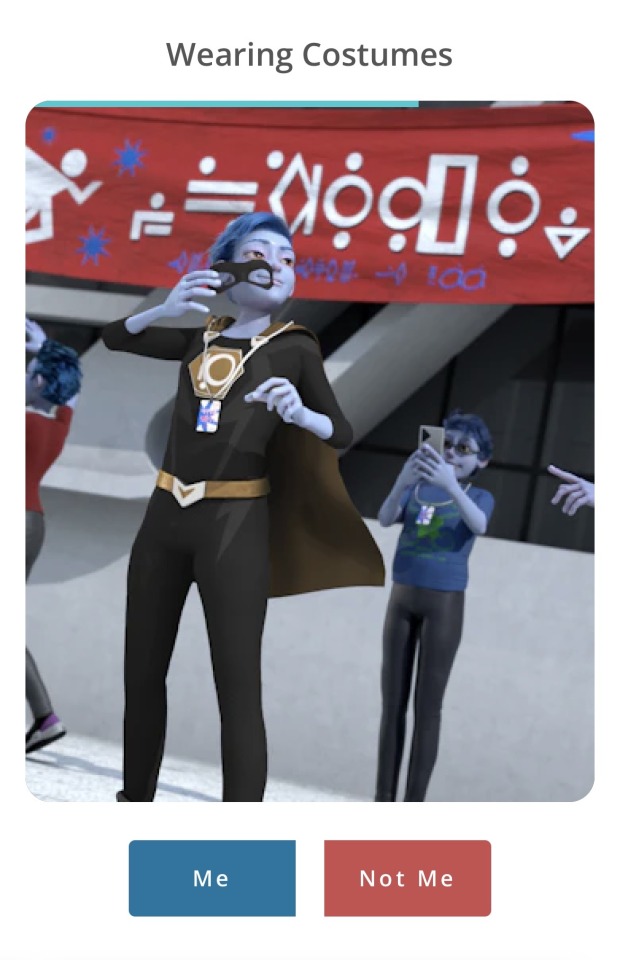

#the end of our society is upon us yall#i think it’s so funny that so much of imaging our future with technology (sci-fi) branches off into two subsection#A. technology gets so advanced that it becomes the governing (tyrannical) power#or B. technology aids humanity in developing a star trek esque utopia of convenience and luxury#but i don’t think anyone predicted this#this weird dependency on technology (especially AI and other ‘smart’ tech) thats actually just shit#like yeah tech is replacing human jobs and doing it worse and less convenient#it wasn’t that long ago when you could call up any store and a real human being would answer#like… 5-10 years ago??#do you remember when you could walk into a store and get a job application and fill it out by hand#in order to get to this ‘personality test’ stage i had to chat with an AI virtual assistant#and then make an account and (after verifying my email of course) filled out my online application (again…)#and then i had to take this personality test#all so i can continue serving ppl highballs and beer??#its sad to see how normalized this is now#anyway as frustrated as i am by the state of the world#i’m choosing to laugh at how fkn dumb this ai test is#i’m gonna post more pics in a sec
19 notes
·
View notes
Quote
The criterion of common sense was never applicable to the history of the human race. Averroës, Kant, Socrates, Newton, Voltaire, could any of them have believed it possible that in the twentieth century the scourge of cities, the poisoner of lungs, the mass murderer and idol of millions would be a metal receptacle on wheels, and that people would actually prefer being crushed to death inside it during frantic weekend exoduses instead of staying, safe and sound, at home?
Stanisław Lem, The Futurological Congress
115 notes
·
View notes
Text
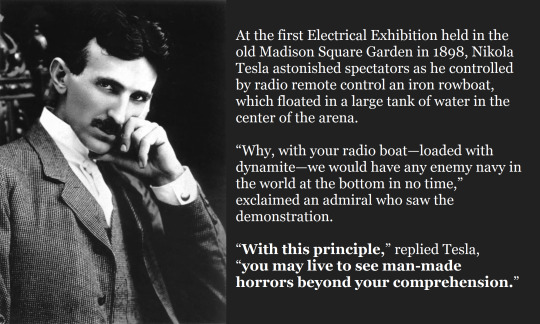
Nikola Tesla, the Prophet of Drone Warfare
#nikola tesla#tesla#drones#drone#ukraine#ukrainian#russian invasion#warfare#technology#futurism#predictions#robotics#robots
5 notes
·
View notes
Text
youtube
In 2056 What a Difference Power Makes (Nursery) | In 20xx Sci fi and Futurism by In 20xx Futurism In a bleak, stormy landscape where the remnants of civilization eke out their existence in deep, canyon-worn refuges, the story plunges readers into the lives of a resilient colony struggling against the decay of both infrastructure and hope. The narrative paints a vividly harsh world where power is scarce and survival depends on ingenuity—from salvaging precious batteries amid ruins to the daily ritual of powering essential systems with human effort. The reader is invited to witness not just the physical battles against nature, but also the emotional and communal struggles that tie the survivors together. At the heart of the tale are characters whose lives are interwoven with the very fabric of their battered environment. Whether it’s a determined tinkerer engineering life-saving devices, or a reluctant caretaker balancing memories of lost innocence with the present need to sustain life, each individual’s story illuminates both the burdens and unexpected moments of beauty in a transformed world. Their interactions blend sorrow with the spark of tenacity, hinting at deeper mysteries and a shared hope that even in the direst conditions, human spirit can prevail. With its immersive blend of gritty survival, inventive adaptation, and poignant reflections on what it means to be human, this story offers a rich, atmospheric journey into a future where the past’s losses and the promise of tomorrow collide. The narrative masterfully avoids clean resolutions, instead leaving readers to grapple with the moral ambiguities of existence in a world stripped to its bare essentials—a world where every innovation is a lifeline, and every moment is a testament to the courage required to simply keep going. batteries solar panels cooling units aeroponics system hand crank flywheel generator power sippers AR glasses BritLights cool suits microbe engineering equipment DNA writer sequencer incubators protein printer pedal-powered generator bike respirators quantum computer Bose-Einstein condensate gravity sensor Stirling engine heat pump air filters hand crank wand canal links GM microbe mix bug trap system battery recharge station mining robot plasma drill graphene tube wiring hydraulic cylinders from a blimp enzyme welder temp shielding aerogel carb-core disks camshafts composite beams quantum simulation radio transmitter hume linking devices mycelium fabric garments mycelium filter sheets Doppler cooling laser Many of the characters in this project appear in future episodes. Using storytelling to place you in a time period, this series takes you, year by year, into the future. From 2040 to 2195. If you like emerging tech, eco-tech, futurism, perma-culture, apocalyptic survival scenarios, and disruptive science, sit back and enjoy short stories that showcase my research into how the future may play out. The companion site is https://in20xx.com These are works of fiction. Characters and groups are made-up and influenced by current events but not reporting facts about people or groups in the real world. This project is speculative fiction. These episodes are not about revealing what will be, but they are to excited the listener's wonder about what may come to pass. Copyright © Cy Porter 2025. All rights reserved. Episode link: https://ift.tt/lRNrm3e (video made with https://ift.tt/y2aJR5Z) via YouTube https://www.youtube.com/watch?v=p9DtQoKQEUs
#emerging tech#eco-tech#apocalypse#survival#disruptive#science#climate#future#short#solarpunk#post-apocalyptic#predictions#futurology#futurism#scifi#sci-fi#technology#tech#black mirror#Youtube
2 notes
·
View notes
Text

From 1969 - an unusual television screen.
#vintage illustration#vintage books#children’s books#magazine art#magazine illustrations#future predictions#the future#the future is now#vintage tech#technology#vintage technology
13 notes
·
View notes
Text

Arnold
ai robot nightmare
the terminator
#terminator#arnold#ai#robots#tesla#future#post apocalyptic#machine war#matrix#movies#predictive#programming#aliens#ufo#drones#robotics#technology#art#drawing#digital art#painting#water color#action film#movie postr#poster#90s
5 notes
·
View notes
Text
Why have people historically turned to predictive behaviours and beliefs, through premonitions; and how has this evolved in the modern world? Abstract: In my essay I aim to understand why people continue to turn to predictive behaviours, either supernaturally or through modern technology, despite all of the evidence which opposes their accuracy. I look at the validity of premonition claims and see how this has evolved with our modern desire to predict and control.
Introduction: How do premonitions traditionally present? A premonition is a forewarning, or presentiment. (Allen, 1990) Premonitions traditionally present as supernatural visions of the future and have often been believed in terms of contact with a deity. In ancient Greek times for example, an oracle would be consulted for prophecies of the future, often seeking guidance in times of uncertainty. In this essay I attempt to analyse why people are drawn to premonitions of the future, and how this has developed over time.
What are they, can they be explained? I started by looking at Déjà vu and premonitions because of the link between the feeling of having already lived through a situation and the precognition of living through a situation. Also, Déjà vu is a common phenomenon, therefore it is easier to find more sound scientific data, rather than focusing on an isolated event where there is little way of discerning the truth. You can find more solid evidence for something observable, repeatable, and measurable, so there needs to be a way to reliably repeat the sensation of Déjà vu.
Methodology: For this project I used studies to back up my main theories about premonition. For example, scientific research about Deja vu and the connection to people having illusory premonition, helped me to reach a conclusion about people relying on the illusion of control to feel secure. For example, the use of unreliable law enforcement technology, creating the illusion of security. I cross-referenced this with studies about how people's desire for premonition, or interest in supernatural abilities increases during times of low control, showing that it is not facts which people are looking for, but instead the comfort that perceived knowledge would give.
Literature Review: I decided to use studies from academic journals to support my project, because they are a reliable source of information. This is because they have been peer reviewed in order to be published. However, there could be problems with funding, as this could create bias. I also used books, as they have had to go through the publishing process, and therefore have to be fact-checked. I used historical case studies from the ancient Greeks in order to show an example of a time where people have believed and relied upon premonition. This research was not intended to act as a reliable source, but instead show an example of illusory premonition, therefore the fact it is inaccurate is part of the research.
Main Findings: Dr Anne Cleary’s Déjà vu Generator: Dr Anne Cleary and her team created a virtual reality Déjà vu generator to try and find the link between precognition and Déjà vu. They spatially mapped scenes to have identical proportions, but the themes were unrelated. People were more likely to report Déjà vu in the scenes that spatially resembled earlier but forgotten scenes amongst spatially unique scenes. If a scene was similar spatially, then Déjà vu was 27% more likely, if it was similar in multiple ways, Déjà vu was 59% more likely. “We cannot consciously remember the prior scene, but our brains recognise the similarity. That information comes through the unsettling feeling that we’ve been there before, but we can’t pin down where or why.”Cleary (Cleary, 2018)
The Déjà vu generator then adapted to try and find an explanation for precognition. The same scenes were taken from the previous Déjà vu test, and converted into virtual reality tours, so that they would unfold over time like a real-life experience. So, a person would be following a virtual tour which would follow a particular navigational path through the scene, and end in a left-hand turn. Then later on in the study a person would be viewing an identically configured tour, following the same navigational path, but only up to a point, stopping just before the final left-hand turn. This was the method of putting someone in the middle of a memory to see if it would enable actual prediction, without being able to recall the previous tour. People showed no precognition ability whatsoever. However, they ran the study again and this time asked, “Do you feel like you know the direction of the next turn?”. Participants were 75% more likely to experience a feeling of precognition, and more likely to feel like they knew the direction of the next turn when they were experiencing Déjà vu then when they were not. (Cleary, 2018)
This experiment does explain Déjà vu, but does it really apply to real life premonitions? Because it does show that our past experiences will create a sense of familiarity and give someone feeling that they know what will happen next, but it doesn’t explain prewarning’s people have, namely ones which come true.
Cleary has a theory which could be used to counteract this, which is, when we are in the middle of a Déjà vu state, it feels like we are right on the verge of retrieving from our memory the entire situation around us, including how it unfolds. As the situation does unfold, and continues to feel intensely familiar, it could be taken to be a signal of having correctly predicted what was going to happen when we actually didn’t. In terms of the Déjà vu generator, when the tour went left, participants were asked if it unfolded as they had expected, and it was found that people are more likely to feel that they knew what would happen all along following Déjà vu. Another variant was run where participants were asked to rate how intense there feeling of familiarity within the scene was, and what was found was that when someone is faced with the juxtaposition of familiarity and novelty, when the familiarity is intense it can lead to an illusion of having known what would happen all along. (Cleary, 2018) (Cleary, 2018)
Analysis: Cleary’s Déjà vu generator still does not explain prewarning’s of an event. There are cases where people experience and record a premonition before it actually happens, which undermines Cleary’s explanation of illusory precognition in these instances. However, the idea of prewarning’s being due to past experiences could still be valid. This is because being subconsciously reminded, by a feeling of familiarity of an event, could be experienced as a prewarning of the event reoccurring. But in these cases, to what extent would this be common sense rather than a premonition? It makes sense for us to learn from our past experiences and to use then to avoid bad events reoccurring, does that have to be a premonition?
As well as this, premonitions regarding the Titanic could be seen through this view too, as although it had never happened before, it makes sense that some people had concerns about its safety, and this does not have to be seen in a supernatural way. (Keefe, 2021) This is relevant to premonitions because it explains how we can understand them as an illusion.
Case study: In 67 AD, Emperor Nero, who was just 30 years old and had killed his own mother in 59 AD, when visiting the Oracle was told: Your presence here outrages the god you seek. Go back, matricide! The number 73 marks the hour of your downfall! The incensed emperor had the Pythia burned alive. Nero thought he would have a long reign and die at 73. Instead, his reign came to a short end after a revolt by Galba who was 73 years of age at the time. (Parke, 2023)
Can these explanations make sense of the case studies? Yes, they can, because the premonition was already desired. The fact that the premonition was considered relevant despite the leap to connect the information, surely shows the desire for the premonitions to be true that discrepancies are overlooked, the fact the man who killed him was 73 and not Nero himself.
What has driven the need for premonitions and does this explain their prevalence? -socio-historical context: Throughout history, premonitions of the future have been believed in a supernatural sense., such as visions from God, or going to an oracle. In these times people had little control over their lives, so feelingthey had access greater power acted as a comfort. In the case of Emperor Nero and the oracle, despite the vague nature of the premonitions, people would maintain faith in them, and even adjust their interpretation of the premonition to find a meaning in it. (Parke, 2023)Oracles would be consulted in times of uncertainty, when the future was unsure, and oracles would give a sense of comfort during that time. This is consistent with Dr Cleary’s conclusion that premonition relies on illusion and people’s faith in them does not come from any real insight into the future, but on a desire to believe that they have more knowledge than they really do.
-individual context: Precognitive abilities would allow people to predict the future, thus belief in these abilities should be differently endorsed when people most desire prediction, that is in situations of low control. Therefore, belief in precognition is a predictive control strategy that people can turn to when feeling low in control. As a result, loss of control will cause an increase in belief in precognition. Loss of control has been found to increase other types of paranormal beliefs, like superstition, which also include an element of being able to predict, or at least guide the future. In the case of precognition, people have a direct and exact channel to knowing the future through psychic means. These types of beliefs should therefore be particularly attractive as predictive control strategies in so far as the give people the illusion of being able to predict and therefore control the future. (Greenaway KH, 2013)
Analysis: This study is in agreement with the conclusions which Cleary drew from her study. She also concluded that it is illusory precognition which occurs, rather than true premonition.
Are they the actualisation of a need within individuals/society? Research: People were drawn to predictability when they experienced loss of control, even to the extent of endorsing seemingly irrational beliefs about precognition. Therefore, these kinds of beliefs are a response to control deprivation, as belief in precognition increases perceived control. Predictive arts are highest in times of threat and uncertainty. It is at these moments that individuals feel the need to control the course of their lives. Belief in precognition meets this need by enabling people to feel that the future is predictable and can therefore be controlled. Regardless of whether precognitive abilities actually exist, therefore, belief in their existence serves an important psychological function of boosting perceived control in times of uncertainty.
How do premonitions present now, what might this say about us? Predictive Technology: If belief in supernatural predictive abilities increases during times of uncertainty, then it makes sense that predictive technology should also experience a surge of popularity. However, the interest in this technology is, like supernatural premonition, not reliant on the accuracy of the technology, but on the perceived sense of control and power gained by the illusion of foreknowledge. This is highlighted by the use of unreliable technologies by the United States Law Enforcement Officers. This technology analyses data to try and predict who may commit crimes and where or when they are likely to be committed. (Fraerman, 2024) The persistent use of unreliable technology shows that people are drawn to the perceived comfort that this technology brings, rather than for any practical reasons.
Research: Health monitoring as a whole has become increasingly popular, with the use of Fitbit’s and apple watches to monitor steps, sleep and even stress. (Burnham, et al., 2018) But recently there has been a trend of non-diabetics wearing continuous glucose monitoring devices. This could be used to demonstrate how people are drawn to predictive control behaviours as there are no real health benefits to wearing these devises and in fact, they can even cause harm by people becoming obsessive and even leading to eating disorders. But despite this Dr Surampudi says, “Wearing a CGM may help someone who is not diabetic make informed nutritional choices, but it also has the potential to cause users to become overwhelmed by the information”. (Surampudi, 2023)
Conclusions: In conclusion, the interest in premonition, through supernatural means or predictive technology, is driven by the comfort that perceived knowledge brings, and it is irrelevant how accurate it really is. When people turn to premonition, they are looking for illusory control in a time where they are in fact lacking in control.
Bibliography: Allen, R., 1990. The concise Oxford Dictionary of Current English. 8th Edition ed. New York: Oxford university press.
Burnham, J. P. et al., 2018. Using wearable technology to predict health outcomes: a literature review.
Journal of the American Medical Informatics Association, 25(9), p. 1221–1227.
Cleary, A., 2018. Youtube. [Online] Available at: https://www.youtube.com/watch?v=0M6qXYJkhDc [Accessed 9 July 2023].
Cleary, A. M. &. C. A. B., 2018. Déjà Vu: An Illusion of Prediction. Sage Journals , 29(4), pp. 635-644..
Fraerman, A., 2024. RELYING ON UNRELIABLE TECH: UNCHECKED POLICE USE OF ALGORITHMIC TECHNOLOGIES. Santa Clara High Technology Law Journal, 40(2).
Greenaway KH, L. W. H. M., 2013. Loss of Control Increases Belief in Precognition and Belief in Precognition Increases Control. PLoS ONE. Keefe, T., 2021. Premonition of the Titanic disaster. 1st ed. Leicestershire: Matador.
Parke, H. W., 2023. Wikipedia. [Online] Available at: https://en.wikipedia.org/wiki/List_of_oracular_statements_from_Delphi [Accessed 15 April 2024].
Surampudi, V. M. M., 2023. UCLA Health. [Online] Available at: https://www.uclahealth.org/news/continuous-glucose-monitoring-becoming-popular-among-non [Accessed 10 December 2023].
#old project#premonition#future#predictions#precognition#precognitive dreams#algorithms#continuous glucose monitoring#illusion#mind#predictive technology#fitness monitoring#oracles#oracle of delphi#knowledge#control
4 notes
·
View notes
Text
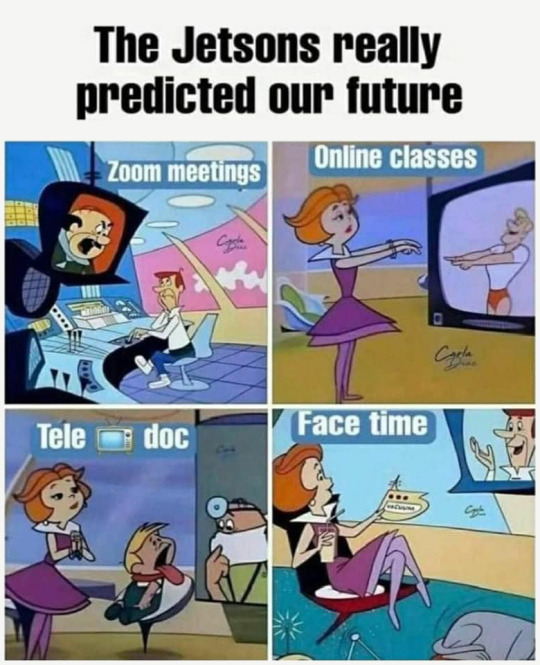
18 notes
·
View notes
Text
The Philosophy of the Future
The philosophy of the future involves a rigorous examination of what lies ahead for humanity and the universe. This field encompasses questions about time, technological advancement, ethical considerations, and the potential directions of human development. By contemplating the future, philosophers aim to understand the implications of present actions, the nature of foresight, and the ethical responsibilities tied to shaping what comes next. It blends elements of metaphysics, ethics, epistemology, and science fiction, offering a comprehensive framework for thinking about what the future holds.
Key Themes in the Philosophy of the Future
Nature of Time and Temporal Experience:
Philosophers explore the metaphysical nature of time, questioning whether the future is predetermined, open, or exists in a multi-dimensional framework.
They examine human experience of time and how our understanding of the future shapes current behavior and decision-making.
Predictive Knowledge and Foresight:
The philosophy of the future delves into the limits and possibilities of predicting future events. This includes the reliability of scientific models, probability theory, and the role of uncertainty.
Philosophers consider how much we can know about the future and the implications of acting on such knowledge.
Technological Advancements and Transhumanism:
The impact of future technologies on society and the human condition is a major area of interest. This includes discussions on artificial intelligence, biotechnology, and the ethics of human enhancement.
Transhumanism, or the idea of transcending human limitations through technology, raises questions about identity, ethics, and the definition of humanity.
Ethical Responsibilities and Future Generations:
Philosophers examine the ethical duties we hold toward future generations. This involves debates on sustainability, environmental ethics, and the distribution of resources.
The concept of intergenerational justice focuses on how present actions affect the welfare and rights of those who come after us.
Utopian and Dystopian Visions:
The exploration of utopian and dystopian scenarios serves as a philosophical tool to understand potential futures and the values that drive them.
Philosophers analyze the societal, political, and ethical underpinnings of ideal and nightmarish futures, often using literature and speculative fiction as frameworks.
Existential Risks and Global Catastrophes:
The study of existential risks, or events that could threaten the survival of humanity, is a critical aspect of future-oriented philosophy.
This includes natural disasters, technological threats, and the ethical implications of preventing or mitigating such risks.
Future of Consciousness and Artificial Intelligence:
Philosophers consider the potential for artificial intelligence to surpass human intelligence and what this means for the future of consciousness.
They explore the ethical treatment of AI, the potential for machine consciousness, and the implications for human society.
Philosophical Implications of Space Exploration:
The potential for space colonization and the search for extraterrestrial life raises questions about human expansion, ethics, and the nature of life in the universe.
Philosophers explore the motivations and consequences of venturing beyond Earth.
The philosophy of the future is a dynamic and multifaceted field that challenges us to think critically about what lies ahead. By examining the nature of time, the limits of predictive knowledge, and the ethical implications of our actions, this philosophy provides a framework for navigating the uncertainties and possibilities of the future. It encourages a forward-thinking perspective that balances hope, caution, and ethical responsibility, shaping our approach to the unknown.
#philosophy#epistemology#knowledge#learning#chatgpt#education#ontology#metaphysics#Future Philosophy#Predictive Knowledge#Technological Advancement#Transhumanism#Intergenerational Justice#Utopian Visions#Existential Risks#Artificial Intelligence Ethics#Space Exploration#Temporal Experience#future#time philosophy#time
3 notes
·
View notes
Text
Q* — the age of Artificial General Intelligence (AGI)?
The possibility of AI general intelligence (AGI). AGI could potentially perform particular jobs better than most people, scientists have said. It could also be weaponized and used, for example, to create enhanced pathogens, launch massive cyber attacks, or orchestrate mass manipulation.
Election-rigging hyperrealistic deepfakes
One of the most pressing cyber threats is that of deepfakes — entirely fabricated images or videos of people that might misrepresent them, incriminate them or bully them. AI deepfake technology hasn't yet been good enough to be a significant threat, but that might be about to change.
This would make it practically impossible for people to distinguish Real News from deep Fakeswith the naked eye
Mainstream AI-powered killer robots
Governments around the world are increasingly incorporating AI into tools for warfare. For example, AI drones allegedly hunting down soldiers in Libya with no human input.
AI can recognize patterns, self-learn, make predictions or generate recommendations in military contexts, and an AI arms race is already underway. In 2024, it's likely we'll not only see AI used in weapons systems but also in logistics and decision support systems
#science#ai#technology#tech#deep fake#killer robots#military#military technology#future predictions#chatgpt#ai learning
2 notes
·
View notes
Text
Tbh whenever I watch old futuristic movies I think about this stuff. They werent so wrong about the future.

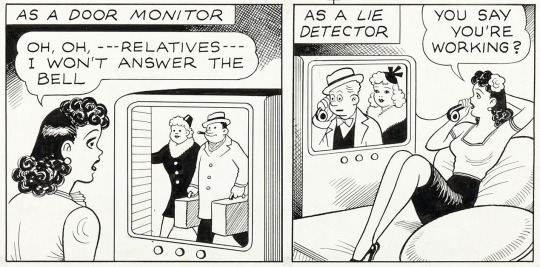

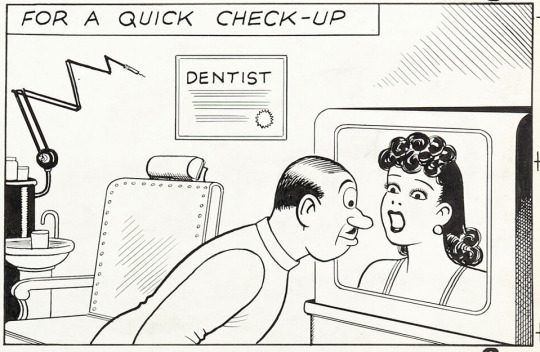

Ernie Bushmiller kind of predicted the Internet in this early 1950's Fritzi Ritz comic
#I guess we are kind of predictable? or they used this kind of works as reference for the technologies to create?#whatever it was. the result was the same lmao#nowadays there arent as many works thinking about the future this way tho#history#technology#tropes#prophecies
31K notes
·
View notes
Text
#medical imaging#artificial intelligence#AI in healthcare#radiology technology#diagnostic imaging#healthtech#AI diagnostics#future of medicine#medical AI#machine learning healthcare#smart diagnostics#digital health#MRI technology#CT scan AI#breast cancer detection#healthcare innovation#neural networks#clinical decision support#explainable AI#predictive healthcare
0 notes
Text
🏥 AI in Healthcare: How Artificial Intelligence Is Revolutionizing Medical Treatment
🤖 What Is AI in Healthcare? AI in healthcare refers to using machine learning, neural networks, and big data to improve medical care. It helps doctors diagnose faster, treat smarter, and monitor patients remotely. Applications include: Disease prediction Robot-assisted surgeries AI chatbots for symptom checking Automated image analysis (X-rays, MRIs, CT scans) 🧬 Faster and More Accurate…
#AI health innovation#AI hospital tools#AI in drug discovery#AI in healthcare#AI in hospitals#AI in medical research#AI patient monitoring#AI-powered diagnosis#artificial intelligence in medicine#future of medicine#health chatbots#healthcare automation#healthcare technology#medical AI#medical data security#next-gen healthcare#personalized treatment AI#predictive medicine#remote patient tracking#robotic surgery#smart diagnosis#smart health AI#smart healthcare system#virtual health assistant#wearable health tech
0 notes